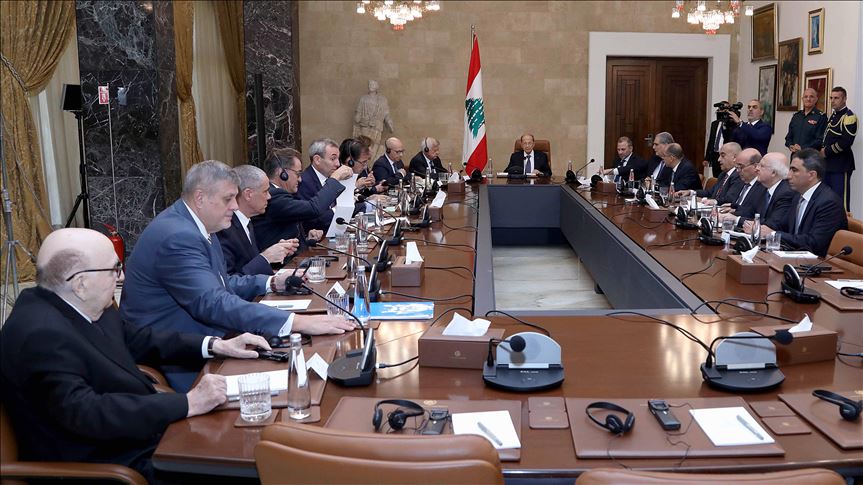Protests continue in Lebanon as no clear political solution to the crisis has yet been found. However, unconfirmed reports emerged about an agreement between three major Lebanese parties to nominate Mohammad Safadi, a former finance minister, to become prime minister. The agreement reportedly was reached between Al-Tayyar al-Watanu al-Horr and AMAL and Hizbollah parties to pick Safadi, finance minister in Najib Miqati cabinet when Michel Suleiman was the president. If true this deal can be a turning point in the future developments of the Lebanese crisis.
Middle East affairs expert Jafar Ghanadbashi has discussed the possible dimensions and ways for Lebanon to come out of the current impasse in an interview with the website of the Strategic Council on Foreign Relations.
Q: How do you see the developments in Lebanon and where is the unrest in the country going?
Four weeks after the unrest and mass protests in Lebanon, there is no clear prospect of how the country will continue to evolve, and officials, parties and political groups have not come up with a common strategy to get out of the current impasse.
Of course, consultations and exchanges of views between Lebanese officials and groups and parties continue, but despite the implicit consent of most parties to the re-appointment of Saad Hariri as prime minister, President Michel Aoun has not delegated the task to him. In the meantime, reports emerge on the appointment of Mohammad Safadi to form a new government.
Meanwhile, parliamentary hearings have been postponed for a number of times, with no specific date or agenda being presented; a point that reflects the critical divisions and depth of the crisis engulfing Lebanon.
In analyzing the crisis, more than anything else, mention must be made of certain currents who seek to take political advantage of the unrest and popular protests in Lebanon. In other words, resolution of economic problems and fulfilling public demands are not a priority for these groups. We see clearly that the groups and parties affiliated to this current not only take no steps to alleviate the problems, but in a variety of ways have fueled unrest and attempted to extend the scope of street protests. In fact, their purpose is to influence the composition of the future Lebanese government and to prevent the effective presence of anti-Western persons opposed to regional reactionary regimes in the new government.
Q: How is the current lineup on the two opposing sides in Lebanon, and what is the position or record of each of the groups and parties in dealing with administrative and economic corruption?
Political parties and groups in Lebanon are divided into two broad categories in terms of the type of stance they have adopted over the past four weeks. Overlooking some of the details, it can be said their dispute is the continuation of competitions between March 14 and March 8 groups for several years. This is under conditions that the regional reactionary regimes and certain Western powers, as in the past, are trying to advance their goals in Lebanon through the March 14 group, by providing them all kinds of support and green lights to force the parties affiliated with this movement to directly and indirectly confront the Resistance movement and March 8 group.
As the Progressive Socialist Party led by Walid Jumblatt and the Lebanese Forces Party led by Samir Geagea have played a major role in spreading the streets protests, thereby trying to realize the demands of the West and the reactionary regimes in the region in forming a new government incompatible with the Resistance even if national security is in serious danger and an acceptable constitutional and political structure will give way to harmful chaos.
Hezbollah, meanwhile, has sought to support the “legitimate popular protests” and underline the need to tackle corruption as well as the need to formulate strategies for resolving economic problems radically and regard any gaps in political structures an obstacle in the way of responding to public demands. At this juncture, it is clear that the elements and currents that are the main culprits of corruption and the escalation of economic problems in Lebanon are trying to put the blame on the March 8 group and the Resistance, and by exploiting the legitimate protests of the people and riding the tide of unrest vacate the scene of power from individuals and groups opposed to the West and the reactionary regimes in the region.
Q: Given what has been said, what can be expected in Lebanon in the short and medium term?
What is certain in the short term is that the Lebanese parliament will have to address the popular demands and ways to meet them, and this is one of the current priorities in the country. Another priority in this situation is to accelerate the formation of the new government and strike the necessary agreements before its inauguration. But this is something that Hariri and the parties affiliated with the March 14 stream are in no hurry to do because in line with the West and the region’s reactionary regimes, they have sought to get concession more than what they deserve by delaying the formation of the government repeatedly and forming the new government in a manner incompatible with last year’s parliamentary election results.
However, the realities in Lebanon cannot be changed and the current controversy will not be able to change the situation in the long run in the interest of foreign interventionist forces.










0 Comments